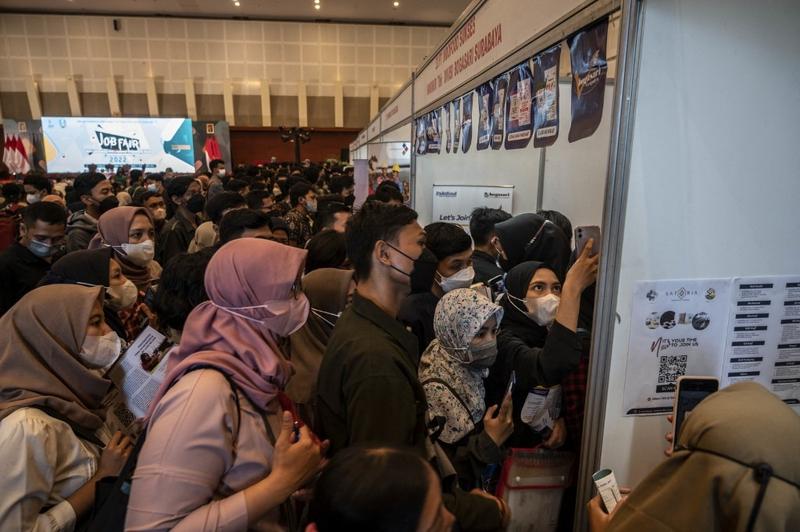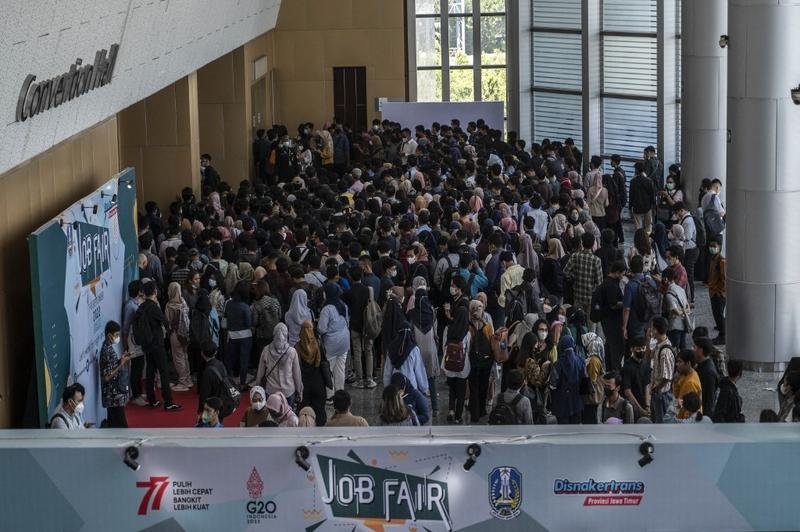 Job seekers line up to visit a job exhibition organized by the provincial government in Surabaya, Indonesia, on Sept 7, 2022. (JUNI KRISWANTO / AFP)
Job seekers line up to visit a job exhibition organized by the provincial government in Surabaya, Indonesia, on Sept 7, 2022. (JUNI KRISWANTO / AFP)
JAKARTA - Indonesia recently issued an emergency regulation on job creation, hoping that it will create a quality business and investment climate for small and medium entrepreneurs and foreign investors in Southeast Asia's largest economy amid fears of a possible global recession.
Indonesian President Joko Widodo signed the regulation last Friday, replacing the controversial 2020 Law on Job Creation that the Constitutional Court declared 'conditionally unconstitutional' in 2021 because its formation did not follow the mandatory procedures.
The so-called omnibus law of 2020 had also been protested by workers, students and environmental groups, saying it reduced labor protection and dismantled environmental safeguards.
READ MORE: Indonesia issues emergency regulation to replace job creation law
Coordinating Minister for Economic Affairs Airlangga Hartarto said that the new emergency regulation was in line with "the urgent need to anticipate global conditions related to the economic crisis and global recession, as well as the need to avert the repercussions of increased inflation and threat of stagflation".
 Job seekers line up to visit a job exhibition organized by the provincial government in Surabaya, Indonesia, on Sept 7, 2022. (JUNI KRISWANTO / AFP)
Job seekers line up to visit a job exhibition organized by the provincial government in Surabaya, Indonesia, on Sept 7, 2022. (JUNI KRISWANTO / AFP)
The emergency regulation is expected to offer more convenience for domestic and foreign investors doing business across the country
Speaking at a press conference at the State Palace in Jakarta last Friday, the minister emphasized that the president had consulted the chair of parliament for the issuance of the regulation.
Hartarto also admitted that the court's decision on the 2020 Job Creation Law had affected Indonesian domestic and international business activities.
Indonesia has set an investment target of 1,400 trillion Indonesian rupiahs (about $89.73 billion) this year, an increase from last year's target of 1,200 trillion rupiahs. The emergency regulation is expected to offer more convenience for domestic and foreign investors doing business across the country.
READ MORE: Indonesia pledges to make ASEAN motor of peace, growth
The government has begun popularizing the emergency regulation in the public. Rules on employment, minimum wages and arrangements for outsourced workers are some of the changes in the new regulation. Some inputs are already in accordance with requests from the labor union in the country, Hartarto added.
However, labor unions in the country have been still rejecting the regulation and plan to challenge it at the Constitutional Court as some provisions still do not favor workers' interests.
READ MORE: Indonesia plans to ban bauxite ore exports starting June 2023
Meanwhile, Indonesian Employers Association (APINDO) chairperson Hariyadi Sukamdani said in a recent press briefing that the issuance of the emergency regulation was a "surprise" and that his association was not involved in its discussion.
He said that the APINDO will need some time to grasp the regulation contained in a document with more than 1,000 pages.


